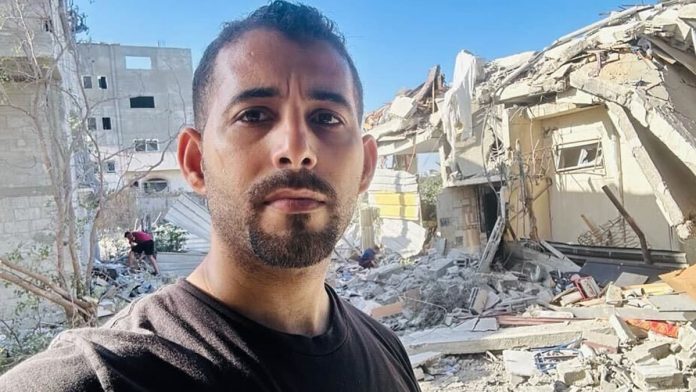Palestinian poet Mosab Abu Toha, who has faced deportation threats from pro-Israel groups in the United States, has been awarded the Pulitzer Prize for commentary, reported the Maktoob Media.
The prestigious prize was announced on Monday in recognition of his four poignant essays published in The New Yorker, which depict the physical and emotional devastation in Gaza. These writings blend investigative reporting with memoir to present an intimate portrait of the Palestinian experience of war.
His essay “The Pain of Travelling While Palestinian,” published in September, detailed the intense challenges of leaving Gaza during the conflict, highlighting the suspicion and indignities Palestinians face abroad.
In “The Gaza We Leave Behind,” written on the war’s anniversary, Abu Toha reflects on the destruction of neighborhoods, communities, and infrastructure—many of which may never be rebuilt.
“Requiem for a Refugee Camp,” published on the final day of 2024, recounts the tragedy of the Jabalia Camp.
In another gripping piece, “My Family’s Daily Struggle to Find Food in Gaza,” Abu Toha describes the horrific day-to-day conditions of living under siege, where survival revolves around a desperate hunt for food, clean water, and shelter amid constant bombardment.
The other finalists in the commentary category were Gustavo Arellano of the Los Angeles Times and Jerry Brewer of The Washington Post.
“I have just won a Pulitzer Prize for Commentary. Let it bring hope. Let it be a tale,” Abu Toha wrote on X (formerly Twitter), echoing the last words of fellow Palestinian poet Refaat Alareer’s final poem, “If I Must Die, let it be a tale,” written before he was killed in an Israeli airstrike in December 2023.
“I’m honored to receive the Pulitzer Prize today. Great thanks to the prize’s jury and board members for honoring me,” Abu Toha added.
He dedicated the award to his “family, friends, teachers, and students in Gaza,” specifically remembering “the 31 members of my family who were killed in one air strike in 2023,” including four first cousins—two of whom died along with their husbands and children—and his great aunt Fatima, “whose ‘corpse’ remains under the rubble of her house since October 2024.”
He also paid tribute to “the graves of my grandparents who I will never find,” his students “who got killed while looking for food or firewood,” as well as “the school where I studied and where I taught,” and “the library that I founded and to which I added one poetry book before 2023.”
“I’m praying for an immediate and permanent ceasefire and JUSTICE and PEACE!” he concluded.
Since January 28, Betar US, a Zionist activist group, has launched repeated social media campaigns against Abu Toha, including calls for his deportation.
Born in 1992 in a refugee camp in Gaza City, Mosab Abu Toha’s life and work are deeply shaped by the realities of war, displacement, and resistance. At the age of 16, he was wounded in an Israeli airstrike in January 2009 that killed six people—an experience that inspired his powerful poem “The Wounds.”
In 2017, he founded the Edward Said Library, Gaza’s first English-language library. A second branch was opened in 2019, but both were later destroyed in Israeli attacks.
He holds a BA in English from the Islamic University of Gaza and taught the language from 2017 to 2023. In 2019, he left Gaza for the first time to attend a Harvard University fellowship and later completed his MFA at Syracuse University in 2023.
On October 13, 2023, 31 of his family members were killed in a single Israeli airstrike, including cousins, their spouses, and children. His own home was destroyed in a bombing on October 28, just weeks after he and his family had relocated to Jabalia Camp.
In November 2023, while attempting to evacuate Gaza, Abu Toha was detained by Israeli forces but later released to Egypt. He eventually moved to the United States, where he now teaches at Syracuse University.
Abu Toha describes himself as “a Palestinian refugee chronicling his people’s lives under siege and war, but also their struggle for justice and dignity.”




